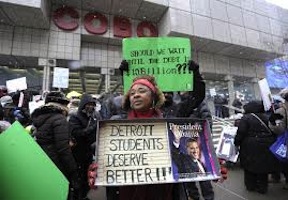Last week’s teacher sickout in Detroit shut down its public school system for three days and put the national spotlight once again on the beleaguered city’s budget woes. The teachers’ action came after they were told that their salaries could not be guaranteed beyond June 30, when emergency funds allocated by the state would run out.
Detroit’s schools long have been the poster child for the many ills that plague the nation’s public schools, especially in high-density, predominantly people-of-color urban areas across America. Now, the city and just about everything associated with it are widely viewed as being beyond fixing.
Detroit’s school system didn’t just develop “problems;” it was targeted for oblivion long before the rest of the city, says Dr. Thomas Pedroni, an associate professor of curriculum studies and policy sociology at Wayne State University and Director of the Detroit Data and Democracy Project. Raced-based policies engineered the demise of the city to make way for a “re-imagined” Detroit, he says, and key to hastening that transition was a wholesale attack on its public schools. Further, Dr. Pedroni says, the model is being replicated all across “urban” America.

